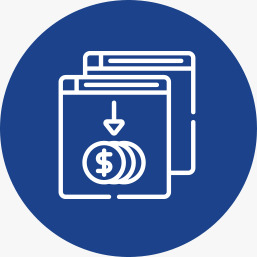Get Started with a Free Quote!

Unlock Seamless Transactions: TMF/MATCH List Merchant Accounts
If your business has landed on the Terminated Merchant File (TMF) or MATCH list, the road to resuming electronic payment processing might appear daunting. However, there's good news—iPay Digital is here to provide solutions that can revitalize your business and restore seamless transactions.
Overcoming TMF/MATCH Challenges
Being on the TMF or MATCH list doesn't signify the end of the line for your business's payment processing capabilities. Our dedicated TMF/MATCH list merchant accounts offer you the opportunity to resume receiving credit card and eCheck payments without the burden of excessive scrutiny.
Qualification Criteria
To qualify for a credit card processing merchant account, your business should maintain a monthly processing volume of at least $50,000. Additionally, iPay Digital offers check processing accounts for MATCH/TMF merchants without a processing volume minimum.
Understanding TMF/MATCH Placement
Understanding why your business may have found itself on the TMF/MATCH list is crucial. Common reasons include account data compromise, excessive chargebacks, fraud-related issues, bankruptcy, and more.
Seamless Solutions, Fast Approvals
At iPay Digital, we recognize the challenges faced by merchants on the MATCH and TMF lists. Our commitment is to provide stress-free solutions that cater to the unique needs of these businesses. We believe that the approval process for TMF/MATCH list merchant accounts should be straightforward, ensuring flexibility for every business.
Expert Guidance for Your Business
If you're uncertain about the best TMF/MATCH list payment processing solution for your business, our team of payment processing experts is ready to assist. We'll engage with you, understand your company's nuances, and guide you toward the solution that aligns perfectly with your needs.
Seize Control of Your Payment Processing
Step away from the anxiety of being on "The List." Empower your business with an innovative payment processing account tailored to your requirements. Contact us today today to embark on a hassle-free journey toward seamless transactions.
Find the Payment Processing Solution Tailored to Your Needs

Debit bank accounts via eCheck and ACH
Effortlessly debit bank accounts with the convenience of eCheck and ACH transactions

Accept Verified ACH payments
Safely and seamlessly accept verified ACH payments for enhanced transaction security

Accept Debit and Credit Card payments
Enable smooth business transactions by effortlessly accepting both debit and credit card payments
FAQ
The TMF Match List, also known as the Terminated Merchant File (TMF) or the MATCH (Member Alert to Control High-Risk) list, is a database maintained by credit card processing networks and associations. It is designed to track merchants who have faced significant issues with their merchant accounts, such as excessive chargebacks, fraud-related activities, or violations of processing regulations.
When a merchant account is terminated due to these issues, the merchant’s information is added to the TMF/MATCH list. Being on this list can significantly impact a business’s ability to open new merchant accounts or process electronic payments in the future, as it signals to payment processors and banks that the merchant may pose a higher risk.
Merchants on the TMF/MATCH list often face challenges in obtaining new merchant accounts or may encounter higher processing fees due to their perceived risk level. It is essential for businesses to understand the reasons for placement on the TMF/MATCH list and take proactive steps to address any underlying issues to regain access to payment processing services.
MATCH stands for Member Alert to Control High-Risk (MATCH), which is a database maintained by credit card processing networks and associations. The MATCH list, also known as the Terminated Merchant File (TMF), is used to track merchants who have faced significant issues with their merchant accounts.
Merchants may be added to the MATCH list for various reasons, including excessive chargebacks, fraudulent activities, violations of processing regulations, or unresolved financial issues. Being on the MATCH list indicates to payment processors and banks that the merchant may pose a higher risk for processing electronic payments.
Being listed on MATCH can have serious consequences for merchants, as it can make it challenging to open new merchant accounts or continue processing payments with existing accounts. Merchants on the MATCH list may face higher processing fees, stricter underwriting requirements, or outright rejection of their applications for new accounts.
It is crucial for merchants to understand the reasons for being placed on the MATCH list and take proactive steps to address any underlying issues. Working to resolve issues that led to MATCH listing can help merchants regain access to payment processing services and improve their overall financial stability.
When a merchant is placed on the Terminated Merchant File (TMF) MATCH List, it can have significant implications for their ability to process electronic payments. Here’s what typically happens:
- Restricted Access to Merchant Accounts: Being listed on the TMF MATCH List usually results in restricted access to merchant accounts. Payment processors and banks may terminate existing merchant accounts or refuse to open new ones for businesses on the MATCH List.
- Higher Processing Fees: Merchants on the TMF MATCH List may face higher processing fees if they are able to secure a new merchant account. Payment processors may perceive them as higher-risk, leading to increased fees to mitigate potential losses from chargebacks or other issues.
- Stricter Underwriting Requirements: To open a new merchant account after being listed on the TMF MATCH List, merchants may need to meet stricter underwriting requirements. This could include providing additional documentation, maintaining reserves, or agreeing to specific terms and conditions.
- Limited Options for Payment Processing: Being on the TMF MATCH List limits a merchant’s options for payment processing. Many reputable payment processors and banks avoid working with businesses listed on the MATCH List due to the perceived risks associated with their accounts.
- Reputational Damage: Being listed on the TMF MATCH List can also result in reputational damage for a business. Customers, partners, and other stakeholders may view the listing as a red flag, potentially impacting the company’s credibility and ability to attract new business.
Overall, being placed on the TMF MATCH List is a serious matter for merchants, and it often requires proactive steps to address the underlying issues that led to the listing. Working to resolve disputes, reduce chargebacks, and maintain compliance with payment processing regulations are essential steps toward regaining access to mainstream payment processing services.
Merchants can be placed on the MATCH (Member Alert to Control High-Risk Merchants) list, also known as the Terminated Merchant File (TMF), for various reasons related to their payment processing activities. Some common reasons why merchants are listed on the MATCH list include:
- Excessive Chargebacks: High chargeback ratios, where customers dispute transactions with their card issuers, can lead to a merchant being placed on the MATCH list. Excessive chargebacks are often seen as a sign of poor customer service, product quality issues, or fraudulent activity.
- Fraudulent Activity: Merchants engaged in fraudulent practices, such as processing unauthorized transactions, using stolen credit card information, or misrepresenting products or services, may find themselves on the MATCH list.
- Breach of Contract: Violating the terms of the merchant agreement with the payment processor or bank can result in placement on the MATCH list. This could include failing to fulfill contractual obligations, such as providing accurate transaction information, maintaining adequate funds in reserve accounts, or complying with industry regulations.
- Non-Payment of Fees: Failure to pay processing fees, fines, or other charges owed to the payment processor or acquiring bank can lead to listing on the MATCH file.
- Bankruptcy or Business Closure: Merchants who declare bankruptcy or close their business without fulfilling outstanding financial obligations to their payment processor or bank may be placed on the MATCH list.
- Identity Theft or Data Breach: Instances of identity theft, data breaches, or compromises of sensitive customer information associated with a merchant’s account can trigger placement on the MATCH list.
It’s important to note that being on the MATCH list can have serious consequences for merchants, including difficulty in obtaining new merchant accounts, higher processing fees, and reputational damage. Therefore, merchants should strive to maintain compliance with payment processing regulations, minimize chargebacks, and uphold ethical business practices to avoid placement on the MATCH list.
The MATCH (Member Alert to Control High-Risk Merchants) List Reason Code List is a comprehensive compilation of codes used to categorize and identify the specific reasons why a merchant has been placed on the MATCH list. Each reason code corresponds to a particular violation or issue related to the merchant’s payment processing activities.
The MATCH list reason code list serves as a standardized framework for payment processors and acquiring banks to communicate the reasons for placing a merchant on the MATCH list. By referencing the appropriate reason code, financial institutions can quickly assess the nature of the merchant’s infractions or risks.
Some common categories covered by the MATCH list reason code list include:
- Excessive Chargebacks: Reason codes related to high chargeback ratios, indicating a pattern of disputed transactions initiated by customers.
- Fraudulent Activity: Codes associated with fraudulent practices, such as processing unauthorized transactions, engaging in deceptive billing practices, or misrepresenting products or services.
- Breach of Contract: Codes indicating violations of the merchant agreement terms, including failure to fulfill contractual obligations, non-compliance with industry regulations, or inadequate documentation.
- Non-Payment of Fees: Reason codes related to outstanding fees, fines, or charges owed to the payment processor or acquiring bank.
- Bankruptcy or Business Closure: Codes signifying bankruptcy filings, business closures, or dissolution without fulfilling financial obligations to the payment processor or bank.
- Identity Theft or Data Breach: Codes indicating instances of identity theft, data breaches, or compromises of sensitive customer information associated with the merchant’s account.
Understanding the MATCH list reason code list is essential for merchants seeking to address the issues leading to their placement on the MATCH list. By identifying the specific reason codes associated with their listing, merchants can take appropriate measures to rectify the underlying issues, regain compliance, and potentially seek removal from the MATCH list.

